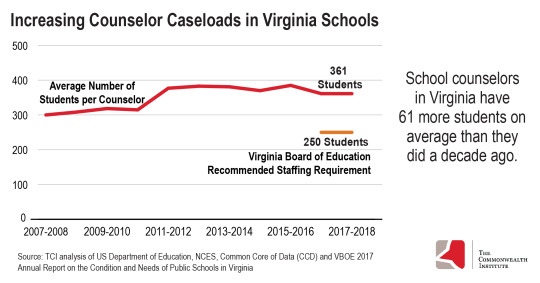February 5, 2020
Sufficiently Staffed Counselors Are Key for Safe and Healthy Schools
Update: This blog has been updated to reflect legislative actions in the House and Senate money committees on Wednesday, Feb. 5, and Thursday, Feb. 6.
This week is National School Counseling Week, which recognizes the importance of comprehensive counseling programs and the essential contributions of school counselors in our schools. Every student deserves a safe and healthy school environment where they are supported academically, socially and emotionally, and school counselors and support staff play a critical role in meeting these needs.
Recent research has demonstrated that access to quality counselors and counseling services makes the most difference for students from families with low incomes and students of color. The impacts speak for themselves: Just one additional counselor at a school can have nearly a 10 percentage point increase on average in 4-year college attendance rates, according to one study. And another study found that, for struggling students, an additional counselor can be twice as effective for increasing 4-year college attendance rates.
Unfortunately, students in Virginia don’t have adequate access to counselors. Increases in student enrollment combined with understaffing have resulted in growing caseloads far above the recommended ratio.
That’s why proposals put forward this legislative session that would increase the number of counselors in Virginia’s schools are so important. The governor’s introduced budget includes funds to reach the nationally- and Virginia Board of Education-recommended threshold of one counselor for every 250 students in the second year of the budget. Del. McQuinn’s (HB 1508) legislation provides state funding for one counselor for every 325 students by the second year of the budget. For high schools, the staffing standard would actually go backwards – from 300 students per counselor the first year of the budget to 325 students per counselor in the second year. Sen. Locke’s (SB 880) legislation to match the governor’s proposal was passed by for the year (a nice way of saying killed) in Senate Finance. Both Del. Aird’s (HB 1316) and Sen. McClellan’s (SB 728) legislation fully fund the recommended ratio both years.
These are critical investments for students across the state. For students to receive the full benefits of a comprehensive school counseling program, the school counselor caseload shouldn’t exceed 250 students. But since the 2007-2008 school year, student enrollment in Virginia schools has grown by more than 57,000 students, while staff available to meet the instructional and support needs of these students has decreased. As a result, the average student caseload for school counselors in Virginia has grown from 300 to 361 students over the past decade, with caseloads in some schools reaching more than 1,000 students per counselor.

These ratios make it exceedingly difficult for counselors to perform the myriad of responsibilities they have in meeting the academic, career development, and social and emotional needs of students. They assist in class selection, study skill development, post-secondary planning, and are involved in the positive social development of students both inside and outside of the classroom.
Counselors have even been shown to improve school climate with regard to engagement, relationships, expectations, and safety. Access to counselors is linked to reductions in chronic absenteeism and higher on-time graduation rates, which prepares students for future success. Schools with lower student-to-counselor ratios also have lower suspension rates, which is especially true for high-poverty schools. In Virginia, where students of color make up a large share of students in high-poverty schools, improving school counselor caseloads would be a step in advancing racial equity in the education system and would help to disrupt the school-to-prison pipeline.
Fair pay, a diverse workforce, and manageable responsibilities are vital for all school staff, and can also promote the well-being of students and families. Just like teacher diversity has measurable impacts for students of color, research has shown that when students of color have counselors of color, their chances of graduating from high school increased by nearly four percentage points. While students need more access to school counselors in general, it’s also important to staff counselors from all backgrounds.
By adequately staffing counselors, Virginia creates an opportunity for students and counselors to spend more one-on-one time together, build deeper and more trusting relationships, and build a school climate where students feel safe and supported. The state has many revenue options that could fund improved counselor ratios. If we leverage revenue solutions, we can live in a commonwealth where every student has access to the full array of services they need to be successful.
While schools, students, and families in the state take the week to give special appreciation for the crucial role that counselors play in students’ lives, so too should the General Assembly. Students can’t afford to wait another year to get the counselors they need. We urge lawmakers to fund school counselor positions to reach the recommended ratio of 1 counselor for every 250 students in the first year of the state budget so that students have the resources necessary for success beyond the classroom.
Category:
Education
